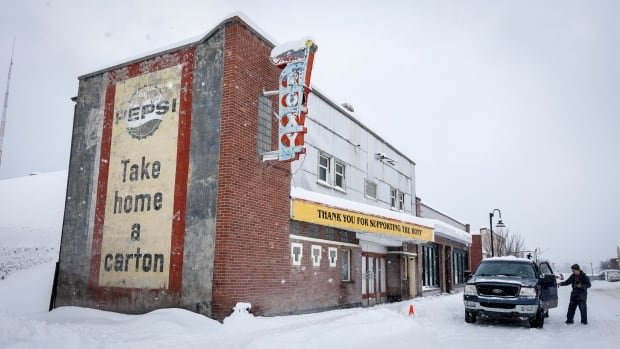Work underway in Alberta town to restore one of last remaining Quonset-style theatres

The historic Roxy Theatre in southwestern Alberta’s Crowsnest Pass has seen better days.
Its neon sign is in need of repair, the inside is bone-chillingly cold, and the heating, flooring, original 275 seats and insulation have been ripped out.
What does remain is the two-storey entrance and lobby, complete with an art deco ticket booth and a coal chute connected to the bones of the Quonset hut-style theatre made of galvanized corrugated steel panels.
It hasn’t been open for 20 years, but there is hope the theatre in downtown Coleman, Alta., that was built in 1948 can be restored to its original glory.
In the theatre’s main auditorium, Fred Bradley describes how everything, including the old insulation, had to be taken out last year.
“This is the guts of the building. This is where the performance stage will be,” says Bradley, a former Alberta cabinet minister who sits on the Revive the Roxy Theatre building committee.
“This place has incredible acoustics. You can whisper here and hear it in the very back.”
Bradley and fellow committee members began planning in 2021 to restore the theatre.
“After the Second World War, the U.S. army had all these surplus Quonsets — 140 of them were converted into what they say is a Quonset-style theatre. This is one of them,” Bradley says.
He adds there are 20 such theatres remaining in North America, with three in Canada. In addition to the Roxy, there is one in Wainwright, Alta., and one in Victoria that just closed.
The Roxy, which was facing possible demolition five years ago, was designated an Alberta provincial historic resource in 2022.
Don Budgen, treasurer and engineer for the Crowsnest Historical Society and the Crowsnest Cultural and Recreation Society, says Quonset-style theatres were easy to erect and quite popular in the U.S. for a time.
“The reason why there’s hardly any left is because as easy as they were to build, they were really easy to tear down and the land would probably become more valuable than the historical value at the time,” he says.
Howard Vandenhoef, the communications director for the historical and cultural societies, added, “As the numbers have diminished, the more valuable they became from a historical context.”
The Roxy has had a number of owners over the years and last operated as a live theatre in 2003, when the Lost Creek wildfire burned for 26 days and resulted in the evacuation of about 2,000 people.
The community also began to see an economic decline with the closing of the coal mines in the area.
$4 million price tag
Work has already begun on fixing the foundation and the roof. Federal and provincial grants, along with fundraising efforts, are paying the bills. The final price tag at this point is $4 million and the goal is to turn the Roxy into a performing arts centre set to open in December 2027.
“It’s an airplane hangar style is what it is. We’ve excavated. The foundation has been restored. The interior has been removed and is ready for restoration,” Bradley says.
“It will all come back.”
The Roxy Theatre was one of 12 heritage sites in the running for the Canada’s Next Great Save contest, which comes with a $50,000 prize for the winner. It finished fourth in the national competition.
Crowsnest Pass Mayor Blair Painter remembers going to movies at the Roxy as a child and he’s grateful for the effort to restore it.
“Absolutely, it would be a boost,” he says.
“Once the Roxy Theatre gets on stream, they feel it will bring in people from all over the place for all the different types of events they want to hold there.”
Source link



